Money! Money! Money!
I know some church members take offense when the Priest talks about money. Maybe this is because they think dirty old money is too unworthy a topic to mention in church. Or maybe because… well, let’s no go there. In either case they would certainly have been offended by their Lord Jesus Christ, who talked about money and possessions a lot.
On the other hand, if all people hear about in church is “give us money money money”, those parishes deserve to go broke. They’re doing something very wrong. We’ll come to that.
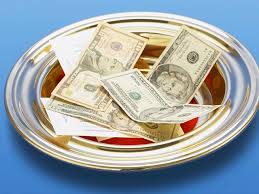 Parish churches, like all institutions, need money. In some places they are supported by the government or by endowments gathered over the centuries. But not here. Most churches in our society depend almost entirely on the annual contributions of their members – and they need to know how much to count on in the year 2020 in order to draw up a budget.
Parish churches, like all institutions, need money. In some places they are supported by the government or by endowments gathered over the centuries. But not here. Most churches in our society depend almost entirely on the annual contributions of their members – and they need to know how much to count on in the year 2020 in order to draw up a budget.
The Orthodox Church’s Sunday lectionary (our format of Scripture readings) was established by the Fathers long ago. But (by divine providence?} many of the readings at this time of year deal with money and possessions. For example, here is this Sunday’s Gospel:
The Rich Farmer
Luke 12:16-21
Christ spoke about money in two ways: He said we should give lots of money to help the poor and needy. And He spoke about the dangers of money and possessions, in and of themselves – of how, if we’re not careful, they can destroy us.
This parable is of the second category.
Here’s the lead-in: A man said to Jesus: “Rabbi, tell my brother to divide the inheritance with me.” Rabbis (teachers) frequently settled financial disputes.
This has often been a problem. I’ve known families to break up over this: Grandpa dies and who gets their “rightful” share of the inheritance? When my mom and her sisters went to the old family homestead after their last uncle died, their cousins had already been there, and everything was gone. Everything! The rooms were bare! To their everlasting credit they did not try to get it back.
Jesus refused to get involved. He who will one day judge the living and the dead (!) said, “Man, who made me a judge or an arbitrator over you?” Instead he issued a stern warning: “Beware of greed, for one’s life does not consist in the abundance of his possessions.”
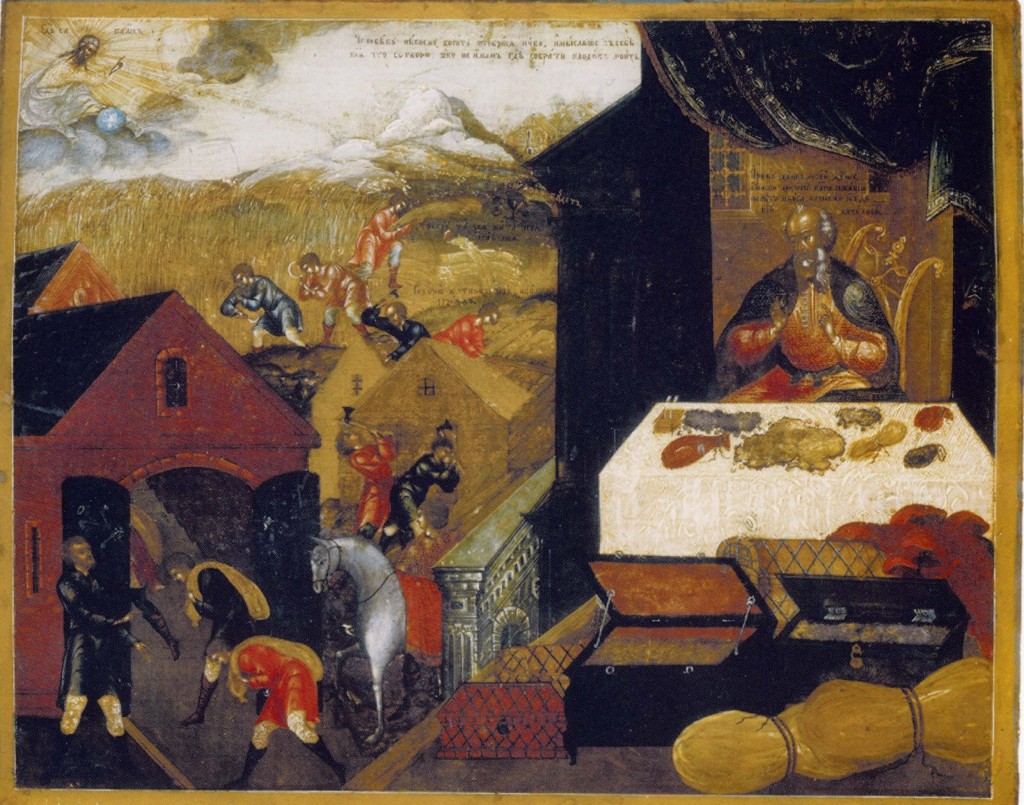 Then he told the parable of the farmer who was rich in material things but poor in the things of God. He now had his barns full, so he said to himself, You have enough money in the bank and in your mutual funds to take care of you for the rest of your life, so relax, eat, drink, be merry. But God said to him, Fool! This night your soul is required of you.”
Then he told the parable of the farmer who was rich in material things but poor in the things of God. He now had his barns full, so he said to himself, You have enough money in the bank and in your mutual funds to take care of you for the rest of your life, so relax, eat, drink, be merry. But God said to him, Fool! This night your soul is required of you.”
What Jesus said about Wealth
He never condemned wealth. Many great things have been financed by rich people. Much has been given to the needy. Look at the art, the museums, the music. Andrew Carnegie, that turn-of-the-20th-century industrialist, was worth about $4.8 billion in today’s terms. He gave almost all of it away. He wrote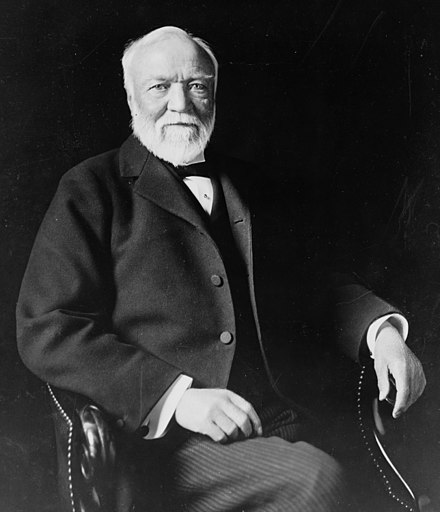 “He who dies rich dies disgraced.” For one thing he endowed libraries in towns, small and large, all over America. In one of those my dear mother gained her lifetime love of books and reading. There are wealthy people today who do the same – and also some who do not, or whose charitable giving turns out to be fake, only for their self-aggrandizement. Anyway, Jesus said only that wealth improperly used is dangerous.
“He who dies rich dies disgraced.” For one thing he endowed libraries in towns, small and large, all over America. In one of those my dear mother gained her lifetime love of books and reading. There are wealthy people today who do the same – and also some who do not, or whose charitable giving turns out to be fake, only for their self-aggrandizement. Anyway, Jesus said only that wealth improperly used is dangerous.
Remember the rich young ruler who came to Jesus seeking eternal life? Luke 18:18-23 – a good man who had kept God’s commandments, but within him he knew that wasn’t enough. Jesus said to him, “You still lack one thing. Sell everything you have and give to the poor, and you will have treasure in heaven. Then come, follow me.” (Note: this was a prescription for this man in this case. Not everyone is called to this, at least not literally.) The man “became very sad, because he was very wealthy”. He valued his wealth more than his salvation. Jesus then said to the Apostles, “How hard it is for a rich man to be saved” – which shocked them: 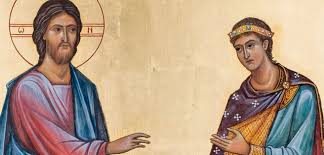 “Then who can be saved?” What he said would shock the wits out most people today. I mean, what is the purpose of life if not to get rich? have more stuff? have an HGTV house? and big showy cars? Watch all these people buying lottery tickets. Though we can’t judge: maybe their goal is to give it all to the need
“Then who can be saved?” What he said would shock the wits out most people today. I mean, what is the purpose of life if not to get rich? have more stuff? have an HGTV house? and big showy cars? Watch all these people buying lottery tickets. Though we can’t judge: maybe their goal is to give it all to the need
P. S. November 28. I unknowingly failed to attribute the above icon to iconographer Katherine Sanders. It first appeared (full-size, which is a whole lot better!) in the Orthodox Arts Journal. See: https://orthodoxartsjournal.org/a-new-icon-composition-christ-and-the-rich-young-ruler/ Apologies to Katherine.
However, the Bible does not say “money is the root of all evil”. It says “The love of money is a root of all evil”. Proverbs 13 which Paul quoted in I Timothy 6. The wealthy farmer’s problem was not that he was rich in material things. His problem was that he was not also rich in the things of God. Instead of using his money and possessions to do good things, he was laying it all up for himself, which was…
…Everlasting Stupidity
For that night God said to him, “Fool. This night your soul is required of you.”
God did not say to the rich farmer: You evil wicked man, you scoundrel. He said: “You fool!” How could you have been so stupid? What? You thought you were going to live forever? You thought you could take it with you? So now here you are on the other side, miserable, hating it because all you ever really cared about is back in your barns, which are being fought over by your heirs or rotting away.
But to repeat, having full barns, having possessions, having money, and appreciating good things, was not the problem here – for God “gives us richly all things to enjoy” 1 Timothy 6:17 In this parable, the problem was thinking that could give him  ultimate security. Of course it can’t do that, not even in this life. I remember when I was young: old people would go on and on about the Great Depression when many of them lost much of what they had, when rich bankers who had gone bankrupt were said to be throwing themselves out the windows of Wall Street skyscrapers.
ultimate security. Of course it can’t do that, not even in this life. I remember when I was young: old people would go on and on about the Great Depression when many of them lost much of what they had, when rich bankers who had gone bankrupt were said to be throwing themselves out the windows of Wall Street skyscrapers.
Certainly losing much of their wealth was dreadful. But was there nothing more to life? Could they not live simply? Had they made no faithful friends to help you through? The people in the small town I grew up in said they had never had so much fun as during the Depression. Instead of having expensive parties they got together for simple church suppers. Instead of going out for entertainment they had people in to play cards or whatever. Instead of buying gifts for each other they made home-made ones, They discovered they didn’t need a lot.
Brothers and sisters, most of us live very well. I know I have so much more than my parents had. A young man from a wealthy family in our parish went to work at Project Mexico, helping to build homes and orphanages for needy people. Below: at St Innocent Orphanage 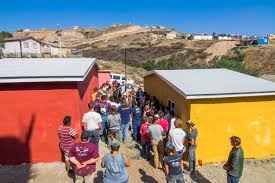 He came back shocked: these people had almost nothing, and they were happy!
He came back shocked: these people had almost nothing, and they were happy!
I mean, really, could you get by without a new granite kitchen counter? that entertainment room? that new car? Or if we don’t have that kind of money… I wonder: could I somehow survive without cable TV? without the internet? (Goodbye, Blog…) Well, pretty soon I will have to.
The Real Purpose of Wealth
Elsewhere Jesus advised: “I say to you, make friends for yourselves by means of unrighteous mammon [money, wealth] so that when that fails you [or it can be translated “when you fail, when you die”] they may receive you into the eternal dwellings”. Luke 16:9
The great Methodist preacher John Wesley said “Earn all you can, give all you can, save all you can”. Give it for the things of God:
Give to the needs of the Church, the needs of the poor. And of course, you and your family are the people whom God has given you and for whom you are directly responsible. We must provide for ourselves and our families, so we don’t become a burden on society. Get your kids through college as best you can these days, or established in a profession.
But I do not mean… Did you see that television commercial a year or two ago where the guy buys two BMW SUVs for Christmas, one for his wife, one for himself, total cost – what? about $100,000? But she liked the one he wants, and he gets stuck with the other, and awww… he is so distraught. So sell it, fellah, and buy a little Honda CRV. If you need more space on occasion, maybe she could possibly share hers? And give the rest to 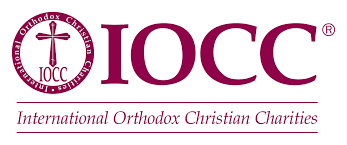 the poor. Find some charities you know and trust. How about International Orthodox Christian Charities?
the poor. Find some charities you know and trust. How about International Orthodox Christian Charities?
Now, back to churches and money.
I said at the beginning that the parish where they’re always begging for money is doing it all wrong. I’m sure I’ve told you this before several times. I’m telling it again not to brag but to make a vital point:
At Saint Nicholas, Cedarburg, from our inception thirty years ago, we have given 10% “off the top” to our Archdiocese and 10% more to charities, plus other donations for special causes. By now our little church has given maybe $650,000 outside our four walls. The result: Have we gone broke? Have we struggled financially? Far from it! We have never had an unpaid bill. We bought a lovely church, and beautified the interior. Below: before we added the festival icons on the iconostasis The mortgage is paid off. We have no 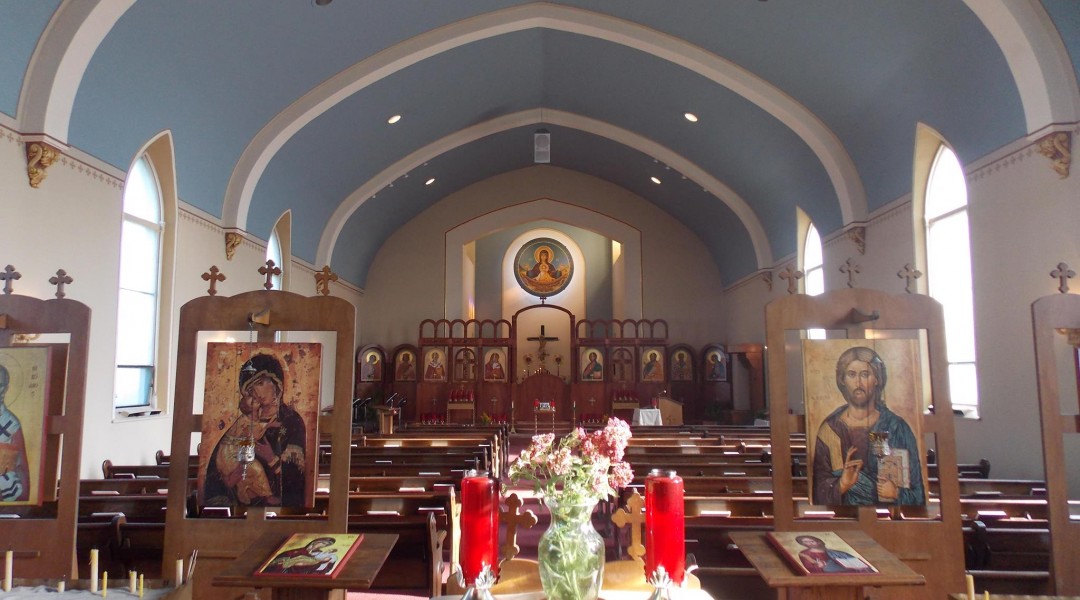 debts. How could this be? As a friend of the parish (memory eternal, Sue) once said, “God never allows anyone to outdo him in giving”. At least that has been our experience.
debts. How could this be? As a friend of the parish (memory eternal, Sue) once said, “God never allows anyone to outdo him in giving”. At least that has been our experience.
And that’s why at Saint Nicholas we almost never need to talk in church about money (only briefly in November), and that’s mostly not about the needs of the parish but only what the Scriptures teach about giving.
Back to the Formerly-Rich Farmer
There is a simple reason why the Great Commandments are to love God with all you’ve got and your neighbor as yourself. Because in the end that’s all you’re going to have left.
Think of all the friends the rich farmer could have had waiting for him on the other side, especially the Lord Jesus who wanted to be his Best Friend, Jesus who had said, ” Provide yourselves money bags that will not wear out, treasure in heaven that will never fail, where no thief comes near and no moth destroys.” Luke 12:33
But we don’t have to wait till we go. Already in this world God and people are the greatest of all treasures. What brings more joy than them?
Let this old man speak. Khouria Dianna and I live more comfortably in our retirement than we ever could have expected. (Could this have any connection with the fact that we have tithed 10% all our lives? Plus we’ve worked our tails off. (Thanks, John Wesley.)
However, beyond any doubt our greatest treasures in life have been the people we’ve known and loved:
Our Lord Jesus Christ who has been the love of my life, and his blessed Mother and Saint Nicholas and Saint Nektarios who have done so much for me, for us.
And here on earth (for now) my Khouria Dianna and our family: Dave and Jen and Paul and our grandchildren. And all the people we’ve known in the Church, both here at Saint Nicholas and at our old Episcopalian parishes – so many good, sincere, faithful, loving, inspiring people, those still here and the many loved ones who have gone on before, who wait on the other side. Sometimes I can hardly wait to get there and we’ll all be together again.
Oh, that poor rich farmer could have had all this! but what he really treasured he had left behind in his barns, and he won’t be coming back here again – not ever. And so God said to him: “Fool.”
 God forbid that you should come to the end of your life like that. There you will be on the other side miserable, alone, because what you really loved, your real treasure, is back here – when you could have had a multitude of friends and loved ones waiting for you over there.
God forbid that you should come to the end of your life like that. There you will be on the other side miserable, alone, because what you really loved, your real treasure, is back here – when you could have had a multitude of friends and loved ones waiting for you over there.
God forbid that the first words you hear over there will be “You fool. How could you have been so stupid?” And that the next words you’ll hear will be: Goodbye. Now go to hell, because you don’t belong here. You’ll never be happy up here. Actually now you’ll never be happy anywhere.
“As Jesus said these things, he cried out: ‘He who has ears to hear, let him hear.'”
Next Two Weeks: More on money: The Orthodox Church’s Theology Giving with some tough words from the Fathers

I love your blog and read it regularly. I couldn’t let the mention of Andrew Carnegie’s generosity go without pointing out that he amassed those riches on the backs of exploited workers, many of whom were Eastern European immigrants and Orthodox Christians. Carnegie chose to build libraries, museums and music halls, but his workers could not feed their families and working conditions in the mills were unsafe and inhuman. He realized he couldn’t take his money with him at the end of his life, but he did not directly help those he regarded as “unworthy”. I do not hold up Andrew Carnegie as someone worthy of emulation.
I’m sorry to hear that. About Carnegie, I mean. What I knew about him from my mother was his good side, and I never checked further.
Larissa,
Carnegie would have followed OSHA and EPA regulations in that day, if there were any. He made his money without any coercion or forced labor. Hard to judge someone back then when the governmental and other social standards were not the same as they are today. And he did it without the tyranny and thievery of a socialist government, who would have stole most of his money by use of the police powers, rather than giving his earned money, voluntarily, through individual generosity, as we are to do as Christians. Governmental socialism is poison and legalized larceny, and goes against individual, voluntary alms giving, which is the standard for Christians. His famous quote “The man who dies rich, dies disgraced” is so excellent.
Thanks, Phil. But doesn’t Christ’s command to love our neighbors as ourselves apply in every age, regardless of “government or social standards”? Also, I hope you’ll allow for the possibility that some of our readers might have a different social/political theory than you do. It is Ancient Faith’s policy that we bloggers should not talk directly about politics, so I’m not going to go there!